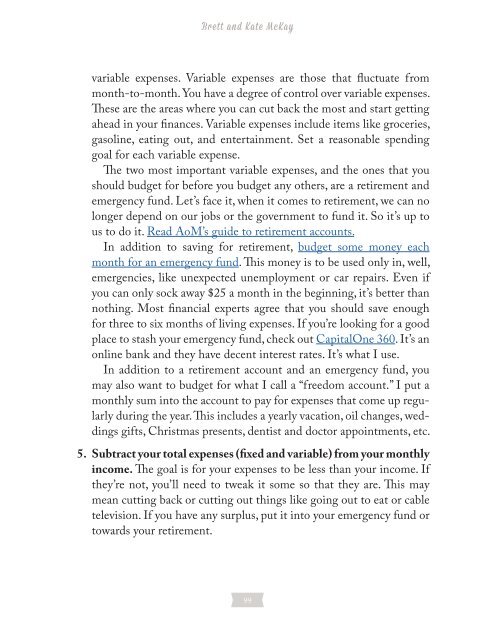6v87YgFhU
6v87YgFhU
6v87YgFhU
Create successful ePaper yourself
Turn your PDF publications into a flip-book with our unique Google optimized e-Paper software.
Brett and Kate McKay<br />
variable expenses. Variable expenses are those that fluctuate from<br />
month-to-month. You have a degree of control over variable expenses.<br />
These are the areas where you can cut back the most and start getting<br />
ahead in your finances. Variable expenses include items like groceries,<br />
gasoline, eating out, and entertainment. Set a reasonable spending<br />
goal for each variable expense.<br />
The two most important variable expenses, and the ones that you<br />
should budget for before you budget any others, are a retirement and<br />
emergency fund. Let’s face it, when it comes to retirement, we can no<br />
longer depend on our jobs or the government to fund it. So it’s up to<br />
us to do it. Read AoM’s guide to retirement accounts.<br />
In addition to saving for retirement, budget some money each<br />
month for an emergency fund. This money is to be used only in, well,<br />
emergencies, like unexpected unemployment or car repairs. Even if<br />
you can only sock away $25 a month in the beginning, it’s better than<br />
nothing. Most financial experts agree that you should save enough<br />
for three to six months of living expenses. If you’re looking for a good<br />
place to stash your emergency fund, check out CapitalOne 360. It’s an<br />
online bank and they have decent interest rates. It’s what I use.<br />
In addition to a retirement account and an emergency fund, you<br />
may also want to budget for what I call a “freedom account.” I put a<br />
monthly sum into the account to pay for expenses that come up regularly<br />
during the year. This includes a yearly vacation, oil changes, weddings<br />
gifts, Christmas presents, dentist and doctor appointments, etc.<br />
5. Subtract your total expenses (fixed and variable) from your monthly<br />
income. The goal is for your expenses to be less than your income. If<br />
they’re not, you’ll need to tweak it some so that they are. This may<br />
mean cutting back or cutting out things like going out to eat or cable<br />
television. If you have any surplus, put it into your emergency fund or<br />
towards your retirement.<br />
99


